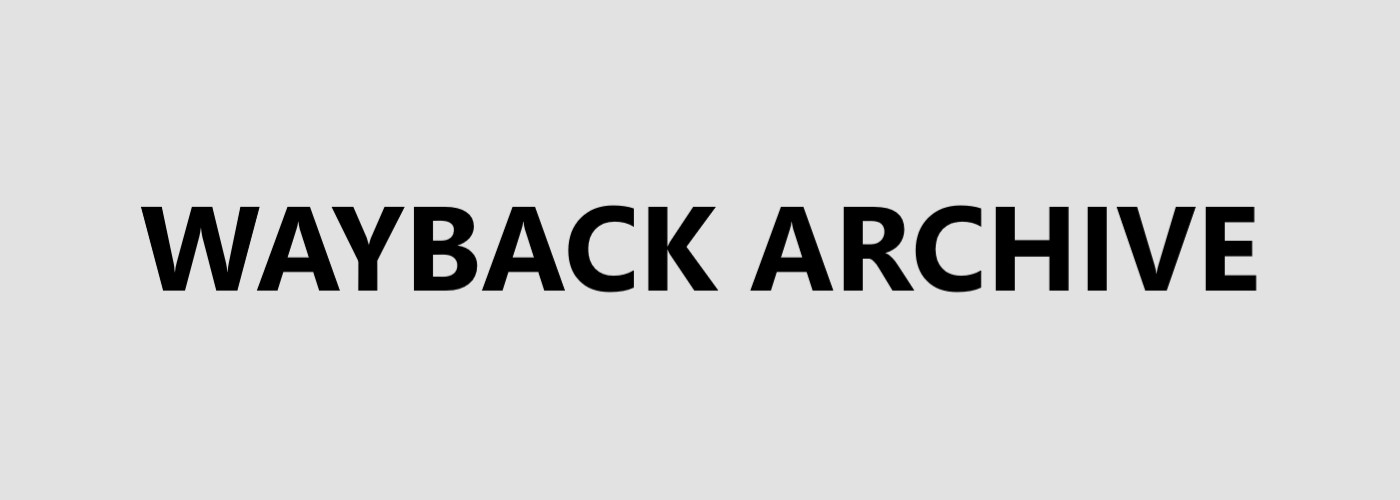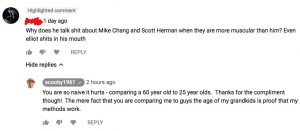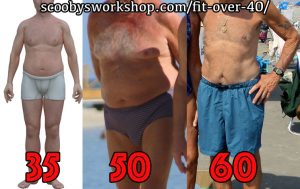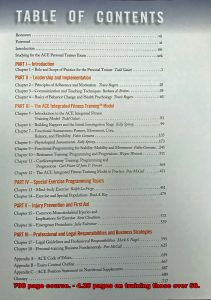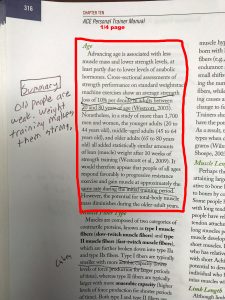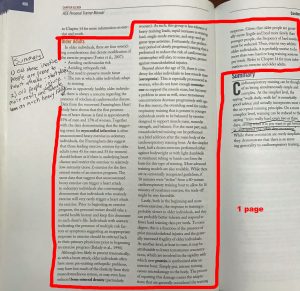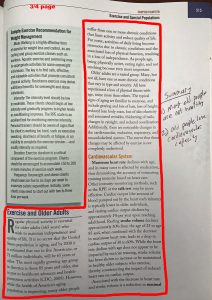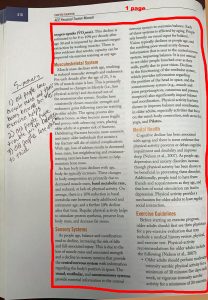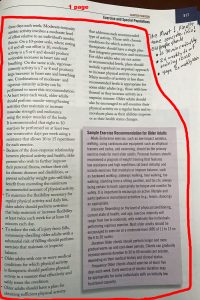Fit Over 40
I have nearly two decades experience being a bodybuilder over forty so have a lot of thoughts and things to pass on. These days, everyone is an expert. The trouble is that none of them seem to agree with each other on the subject of how older people should train. What everyone agrees on is that weight training can be even more beneficial to older people than it is for younger people. It is never too late to get into shape by doing resistance training, cardio, stretching and balance work. Being stronger and leaner not only *looks* better but it allows you to live a more active, vibrant, and enjoyable life!
Can you gain muscle if you are over 40?
40 is young. 50 is young. 60 is young. Exercise can help you extend your quality of life into your 70s, the key is being strong and flexible so that you don’t get injured, getting the extra fat off so you can move easily, and working on balance so you don’t fall. No reason that 70 year olds cant jog, play volleyball, go hiking, and enjoy all kinds of outdoor sports. One thing that people really get confused about is whether they can expect to gain muscle or not when they are over 40 – it depends!!!
If you have never worked out before: You CAN gain strength, you CAN gain muscle, you CAN improve your cardiovascular system, you CAN get sixpack abs, and you CAN enjoy outdoor sports. Will you be able to get as strong as a 19 year old? Certainly not. Will you be able to get as muscular as Arnold, certainly not. BUT, if you have never lifted weights before you WILL immediately feel better, have more energy, and see your strength increasing week after week. With a good nutritional plan and workout plan, even the most obese can get down to 10% bodyfat (20% women) in a year or two and you will see bigger muscles. You CAN make incredible progress but its a very slow process, count on a 3-5 year plan. There is plenty of research that shows that people in the 40-70 age range who have never lifted before can gain significant muscle and strength.
If you have been working out seriously for decades: Then your goals and expectations are different than the newcomer to fitness. If you have worked out hard like me and are close to the natty limit, then there is nowhere to go with age other than downhill. When you hear the research that shows older lifter can gain muscle, that does not apply to us! You will not gain muscle, in fact you will lose it. You will not gain strength, you will lose it. At some point in your fitness life trajectory, the goal will become to maintain strength and muscle mass. At a later stage, the goal will become to slow the decline. Not a happy thought but it is what it is. I started lifting at age 22 and have been lifting consistently 52 weeks a year ever since then without breaks. I peaked in muscle mass and strength about in 2001 at age 40 (see my 30 year physique history). My 40’s I worked out even harder than I ever had but no gains at all, in fact, the decline had begun. In my early 50s, despite as intense as ever workouts the decline continued.
Why I am writing about aging and bodybuilding
The short answer to why I am writing about aging and bodybuilding is because nobody else is and very few people understand it. This point is made clear to me on a daily basis with YouTube comments. People saying things to me like “You should work on your neck” or “you should work on your traps”. People over 50 do NOT lift for aesthetics, we lift for mobility, for functionality, and for health. Because entire families do not live together under one roof as many do in Asia, most young Americans have never seen their grandpa with his shirt off so they have no idea what a 60 year old physique looks like nor do they have any idea how the human body ages or what difficulties older people are faced with on a daily basis. The highest form of compliment is when someone “insults” me by telling me I dont look as good as someone who is literally the age of my grandkids :) Here is an example from this week:
The really scary thing is that its these same young people with no exposure to aging and the human body spew dangerous advice on YouTube. They cant even tell a 35 year old from a 60 year old – they certainly have no idea how we need to train differently to avoid injury.
For those of you who do not know what a normal physique of older men look like:
Why many bodybuilding experts aren’t
There are many powerlifters and bodybuilders with very impressive credentials who are acknowledged experts in their field who still give horrible advice for those over 40. The reason can be found in the bolded phrase “experts in their field”. Take someone like Mark Rippetoe who is acknowledged to be a strength training expert and his book “Starting Strength” is the textbook reference guide on form for deadlifts, squats, and bench press. Despite Mark Rippetoe’s expert status, he is dangerously clueless about the needs and limitations of those over 40. His claim is that deadlifts and squats are good for EVERYONE and like all strength trainers, he loves to point to one 70 year old in Finland (Esko Ketola). First, there is a big difference between starting deadlifts and squats when you are 60 and starting as a teen and just keeping them up. How many people learn to do the rings in gymnastics at age 60? About zero. Secondly, pointing to one 70 year old powerlifter as proof that squats and deadlifts are good for all older people is like a frog who safely hopped across the 10 in Los Angeles at rush hour claiming that crossing the 10 is safe.
Why YouTube trainers don’t care about those over 40
First and foremost because there is no money in it which is ironic because this age group is amongst the wealthiest. This age group has learned to have a healthy skepticism for everything and are not fooled by supplement hype. Because supplement sales is how 70% of high profile fitness trainers on YouTube make their money, a demographic who does not fall for their sales pitch has no interest to them. Also, 50 year olds and 60 year olds in 2019 do NOT get their information from YouTube. They are old school like me. They read books and read research. Why bother making videos catering to people who dont have a YouTube account? The third factor is that the people who are over 50 and really dedicated to improving their health are typically have lots of disposable income. For this group, saving time and maximizing results is the prime consideration so they hire professionals rather than looking for cheap online information. A 60 year can often afford to hire a physical therapist or physiotherapist (medical professionals) to guide their exercises programs where almost no people in their twenties can afford this.
Where to get advice
On the internet, everyone is an expert. You have 18 year old kids selling $300 workout programs that give you the benefit of “their entire life” worth of experience. You have the powerlifter disciples screaming that EVERYONE should squat and deadlift as they point to one 70 year old powerlifter in Finland as proof that powerlifting is good for old people. Then you have the YouTube “Fitness Experts” who claim that THEY know how older people should train. Then we have the “certified personal trainers” who everyone seems to defer to. Lets start with this. If you are over 40, unless ALL your joints, back and spine are 100% healthy the only person qualified to help you with your training is a physical therapist (physiotherapist outside USA). These are medical professionals who do 8 years of university training plus a residency. So you are over 40 and want to start training, who do you listen to?
- YouTube
- physical therapists
- personal trainers
- old, experienced lifters
Getting lifting advice from YouTube
For people over forty, its not their first day at the rodeo. They realize that there is no such thing as shortcuts. People over 40 have learned to ask questions rather than just accept what they are told without question. They know they need to:
- Follow the money. What is the YouTube trainer’s motivation. Does the person giving the advice make money, and if so, how. A personal trainer gives you advice and you pay them, completely transparent. YouTube tends to be a little more sleezy. Many trainers make their big money from selling useless supplements and overpriced eBooks so their “free videos” are really just commercials for their merchandise.
- Ask why you should listen to them. What skills/experience do they have that makes them qualified to give you advice. If they are “a doctor”, ask which kind because a doctorate in a non-fitness related field is a laughable qualification. If they are a “certified personal trainer”, then read the below section. Are they someone who has lots of experience? If so, is their experience applicable to you? A 20 year old steroid using powerlifting record holder has LOTS of experience but if you are a 50 year old, how much of that experience will be applicable to you?
Hiring Physical Therapists (Physiotherapists outside USA)
A Physical Therapist is a medical doctor who goes thru 8 years of college and then residency to become an expert at exercise and injury rehab. Without a doubt, the absolute best person to help you start an exercise program if you are older and have some joint issues is a physical therapist. I will let you in on a little secret here, they hate dealing with insurance and I have found that it is relatively easy to get the to give a substantial discount if you pay cash insted of using insurance. Not only that, paying cash frees them from having to waste all kinds of time doing “intake measurements” and baseline paperwork that is not relevant to you. If you are paying them cash, you can get right down to training without the paperwork. The one I found locally when I was working around my knee issue trained me for about 50% more than a personal trainer would have charged which is a TOTAL bargain considering how much more education and exerience they have. Consider reaching out to some local therapists and see if they would be willing to show you a workout routine to help you work around your joint issues. Again, this is the gold standard, it does not get any better than this, Having said that, make sure you get a physical therapist who works with athletes.
Yes, Physical Therapist sounds kinda like Personal Trainer and they both have the same initials (PT) but that is where the similarities end so please do not confuse them! A personal trainer on the other hand is NOT a medical degree and depending on the certifying organization, it can take between a weekend and a month to complete the training. 10 years of university for a physical therapist, a weekend for a personal trainer but they are both “PT”s so be careful.
Hiring Personal Trainers
What 99% of people who are over 40 do when they want to “get in shape” is they hire a personal trainer. There are a lot of excellent personal trainers out there so I am not knocking personal trainers. For many getting started in fitness they are perfect. For those over 40, in my opinion it is not a good idea. Would you let someone who only works on Ferraris tune up your Toyota Corolla? I hope not. A lot of personal trainers love to tout that they are experts and that they are “certified”. Before you run out and hire a personal trainer there is something you really need to know. In America, ACE (American Council on Exercise) is the largest organization so most trainers you would hire would be certified by ACE. Lets look at the training they get in helping people over 40. The training manual has 700 pages and just 4.25 of them cover age related issues. Here are the 4.25 pages where “certified trainers” learn how to optimize training for those over 40:
The things covered in those 4 pages are just common sense in my opinion. One does not need a certification to know that getting old sucks. If you are over 40 and starting to lift, a “certified personal trainer” has no expertise at all how to help you. A certified personal trainer will kinda just give an older person the same basic workout they give the teens and twenty somethings but just use less weight because they have no knowledge of how to adapt a workout for the joints, muscles, and tendons of older people. The fact that they have “a lot of older clients” does not mean that they know how to help them and optimize their training.
Getting lifting advice from old, experienced lifter
In many eastern cultures, the elderly are respected for their wisdom – not so much in the West. Perhaps the truth is someone in the middle. The older you are, the more experienced you are. If you are smart and old, you gather information, learn from it, and formulate new theories, ideas, and philosophies based upon this cumulative experience . BUT, just because you are old does NOT mean you are smart. There are a lot of clueless old people just as their are a lot of clueless young people. When it comes to hiring someone who will help you get fit there are several important things:
- Do they have the knowledge? If you have had ACL surgery and need help with rehab exercises, thats a very specific medical knowledge. Push too hard and things snap. Dont push hard enough and you can permanently lose flexibility.
- Do they have the teaching ability? A great example is that really, really good swimmers make terrible coaches. For them, swimming is effortless. They never had to break things down to learn them, they just DID IT. It does no good to have the ability and the knowledge if you cant communicate it clearly.
- Do they have the experience? If they have never been able to do what you are trying to do, how can they possibly teach you how to do it?
There is a saying:
“Those who can’t do, teach.“
There is a lot of truth to this. You would be unwise to hire a personal trainer to help you lose weight and get sixpack abs who is obese and has never had abs in their life. The real issue is have they ever been able to accomplish what you are trying to accomplish and why did they stop? Its completely understandable that an olympic gymnast quits competing and moves to coaching because the physical demands of the sport severely limit the career duration. On the other hand, if they have never been able to do a handstand in their life they are never going to be good at teaching you how to do it.
Back to the issue of getting your training advice from an old, experienced lifter. This can be really good because if they have been lifting for decades then its pretty clear that they know how to do it without getting injured. They may not know how to become Arnold and compete in the IFBB but they at least know how to keep active and fit. They know how to limit wear and tear on the joints and avoid injury which are very important issues with an older lifter. An ideal combination is an experienced older lifter who is a certified personal trainer!!!! Remember you can’t tell this by looking. Just because they are old and a personal trainer does not mean that they have decades of lifting experience – they may have just started.
How can you workout to preserve your joints?
The interesting thing is that I am “Patient Zero” for old natty bodybuilders. We have a lot of old bodybuilders still living like Arnold Schwartzenneger and Tom Platz but they are different. They lifted when steroids were legal and their health and fitness journey is not applicable to people today. I am one of the first people who started lifting in the post steroids world who has lifted consistently and seriously for 36 years. I am a glimpse of what the current generation of lifters will face. When I was 20, only football players and competing wrestlers lifted weights. These days, it seems almost everyone in high school lists and many are way more advanced in terms of strength, muscle mass, technique, and nutrition than people of my generation were with 20 years of experience. These young lifters are lifting heavy and lifting often and my joint problems are their future. The lifting techniques I have to use are going to be required by them. For those not wanting to follow in my footsteps I have a lot of ideas about how to train differently to get 90% of the gains with 1/4 the joint wear and tear. Most of this fit-over-40 series will be about how older lifters should workout but also how young lifters can help to keep their joints healthy enough to become old lifters :)
